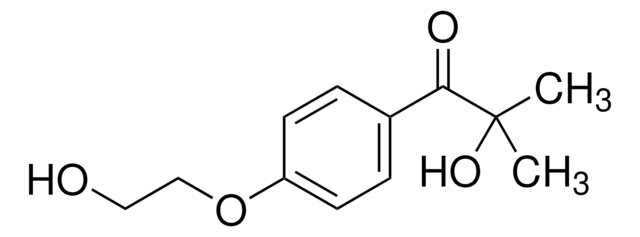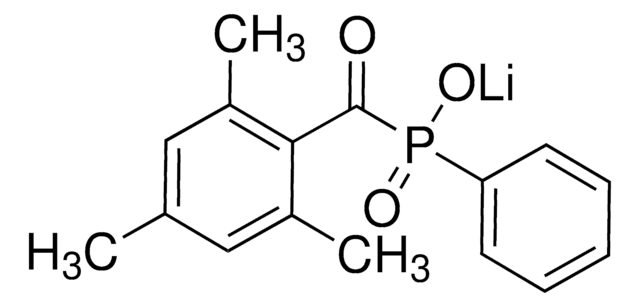701963
Poly(ethylene glycol) diacrylate
average Mn 6,000, acrylate, ≤1,500 ppm MEHQ as inhibitor
Synonym(s):
Polyethylene glycol, PEG diacrylate
About This Item
Recommended Products
product name
Poly(ethylene glycol) diacrylate, average Mn 6,000, contains ≤1500 ppm MEHQ as inhibitor
form
solid
Quality Level
mol wt
average Mn 6,000
contains
≤1500 ppm MEHQ as inhibitor
reaction suitability
reagent type: cross-linking reagent
reaction type: Polymerization Reactions
transition temp
Tm 59-63 °C
Ω-end
acrylate
α-end
acrylate
polymer architecture
shape: linear
functionality: homobifunctional
storage temp.
−20°C
SMILES string
OCCO.OC(=O)C=C
InChI
1S/C8H10O4/c1-3-7(9)11-5-6-12-8(10)4-2/h3-4H,1-2,5-6H2
InChI key
KUDUQBURMYMBIJ-UHFFFAOYSA-N
Looking for similar products? Visit Product Comparison Guide
Related Categories
General description
Application
It can be used as an alloying agent to prepare polymer membranes for gas separation applications. For example, an alloyed poly(Ether Block Amide)/ PEGDA membrane can be used for the separation of CO2/H2.
It can also be used as aprecursor to fabricate polymer electrolyte membranes(PEMs) for flexible Li-ionbatteries. The addition of PEGDA enhances the ionic conductivity, thermal stability,and mechanical toughness of PEMs.
Features and Benefits
- Highly hydrophilic
- Non-toxic
- Biocompatible
- Non-immunogenic
Signal Word
Danger
Hazard Statements
Precautionary Statements
Hazard Classifications
Eye Dam. 1 - Skin Irrit. 2 - Skin Sens. 1
Storage Class Code
11 - Combustible Solids
WGK
WGK 1
Flash Point(F)
Not applicable
Flash Point(C)
Not applicable
Personal Protective Equipment
Choose from one of the most recent versions:
Already Own This Product?
Find documentation for the products that you have recently purchased in the Document Library.
Customers Also Viewed
Articles
Patterning of PEG-based Hydrogels - Engineering Spatial Complexity
Devising biomaterial scaffolds that are capable of recapitulating critical aspects of the complex extracellular nature of living tissues in a threedimensional (3D) fashion is a challenging requirement in the field of tissue engineering and regenerative medicine.
Our team of scientists has experience in all areas of research including Life Science, Material Science, Chemical Synthesis, Chromatography, Analytical and many others.
Contact Technical Service








